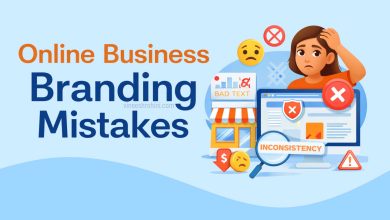What is Online Branding – Strategies, Scope, Elements, Importance
Online branding refers to the process of creating and maintaining a brand’s image, identity, and reputation on the internet. It is a critical aspect of digital marketing that helps businesses establish a strong online presence, attract more customers, and build brand loyalty. In this essay, we will discuss the importance of online branding, the key elements of a successful online brand, and some strategies to enhance online branding efforts.
Online branding refers to the process of establishing, managing, and promoting a brand’s image and reputation on the internet. In today’s digital age, businesses need to have a strong online presence in order to remain competitive and attract customers. Online branding involves creating a consistent and recognizable brand identity across various online channels such as websites, social media platforms, search engines, and online advertising.
The goal of online branding is to build trust and credibility with customers, establish a unique and memorable brand identity, and differentiate a business from its competitors. Online branding involves various strategies and tactics, including website design, social media marketing, content marketing, email marketing, search engine optimization (SEO), online advertising, and online reputation management.
Website design plays a crucial role in online branding, as a business’s website is often the first point of contact between the brand and its customers. A well-designed website that is user-friendly, visually appealing, and optimized for search engines can help businesses establish credibility and attract more customers.
Social media platforms such as Facebook, Twitter, and Instagram are also powerful tools for online branding. By creating and sharing content that reflects the brand’s values and personality, businesses can engage with their target audience, build brand awareness, and drive sales.
Content marketing involves creating high-quality content such as blog posts, videos, and infographics that educate and inform customers about a brand’s products or services. By establishing themselves as thought leaders in their industry, businesses can attract more customers and build brand loyalty.
SEO is another important aspect of online branding, as a strong SEO strategy can help businesses increase visibility, drive traffic, and generate leads. By optimizing their website and content for search engines, businesses can rank higher in search engine results pages and attract more potential customers.
Online advertising is another effective way to build brand awareness and attract customers. By leveraging various forms of digital advertising such as pay-per-click (PPC), display ads, and social media ads, businesses can reach a larger audience and drive conversions.
Importance of Online Branding
The increasing reliance on digital technologies and online platforms has made it essential for businesses to establish a strong online brand. A strong online brand can:
- Create brand awareness: A well-defined online brand can help businesses reach a wider audience and create brand awareness. By leveraging various online channels such as social media, blogs, and forums, businesses can reach out to potential customers and establish themselves as industry leaders.
- Build brand credibility: A strong online brand can help businesses build credibility and trust with their customers. By consistently delivering high-quality products or services and engaging with customers through online channels, businesses can establish a reputation as reliable and trustworthy.
- Increase customer engagement: Online branding can help businesses engage with their customers and build strong relationships. By leveraging various online channels to communicate with customers and respond to their queries, businesses can create a sense of community and foster customer loyalty.
- Drive sales: A strong online brand can help businesses drive sales and revenue. By building brand awareness and credibility, businesses can attract more customers and increase their market share.
Key Elements of a Successful Online Brand
- Brand identity: Brand identity refers to the visual and verbal representation of a brand, including its logo, color scheme, tone of voice, and messaging. A strong brand identity can help businesses establish a recognizable and memorable brand image.
- Brand personality: Brand personality refers to the human characteristics and traits that are associated with a brand. A strong brand personality can help businesses connect with their target audience and differentiate themselves from their competitors.
- Brand positioning: Brand positioning refers to the unique value proposition that a brand offers to its customers. A strong brand positioning can help businesses establish themselves as industry leaders and create a competitive advantage.
- Brand consistency: Brand consistency refers to the ability of a brand to deliver a consistent and cohesive brand experience across all touchpoints. Consistency can help businesses build trust and credibility with their customers.
Grow Your Brand Online With Instagram Ads
Scope of online branding
The scope of online branding is vast and ever-evolving, given the rapid pace of technological advancements and changing consumer behavior. Online branding includes all aspects of creating, managing, and promoting a brand’s image and reputation on the internet. Here are some key areas of focus within the scope of online branding:
- Brand identity: Online branding starts with establishing a clear and consistent brand identity. This includes developing a brand name, logo, color scheme, and tone of voice that reflects the brand’s values and personality.
- Website design: A website is often the first point of contact between a brand and its customers. A well-designed website that is user-friendly, visually appealing, and optimized for search engines can help businesses establish credibility and attract more customers.
- Social media marketing: Social media platforms such as Facebook, Twitter, and Instagram are powerful tools for online branding. By leveraging social media channels, businesses can engage with their target audience, build brand awareness, and drive sales.
- Content marketing: Creating high-quality content such as blog posts, videos, and infographics can help businesses establish themselves as thought leaders and attract more customers. Content marketing also helps improve search engine optimization and drives traffic to a brand’s website.
- Online reputation management: Managing a brand’s online reputation is essential to building trust and credibility with customers. This includes monitoring customer feedback and reviews, responding to customer inquiries and complaints, and addressing negative comments and reviews.
- Search engine optimization (SEO): SEO is the process of optimizing a brand’s website and content to rank higher in search engine results pages. A strong SEO strategy can help businesses increase visibility, drive traffic, and generate leads.
- Influencer marketing: Influencer marketing involves partnering with influential individuals or organizations in a brand’s industry to promote products or services. This can help businesses reach a wider audience and build credibility with their target customers.
- Email marketing: Email marketing is a cost-effective way to communicate with customers and promote products or services. By creating targeted email campaigns, businesses can increase engagement and drive sales.
- Online advertising: Online advertising includes various forms of digital advertising such as pay-per-click (PPC), display ads, and social media ads. Online advertising can help businesses reach a larger audience and drive conversions.
Strategies to Enhance Online Branding Efforts
- Define your brand: The first step to enhancing your online branding efforts is to define your brand identity, personality, and positioning. This will help you establish a clear and consistent brand image across all online channels.
- Leverage social media: Social media is a powerful tool for online branding. By leveraging social media channels such as Facebook, Twitter, and Instagram, businesses can engage with their customers, build brand awareness, and drive sales.
- Create high-quality content: Creating high-quality content such as blog posts, videos, and infographics can help businesses establish themselves as industry leaders and attract more customers.
- Optimize your website: A well-designed and optimized website can help businesses create a positive user experience and establish credibility with their customers.
- Monitor your online reputation: Monitoring your online reputation and responding to customer feedback can help businesses address issues and build a positive brand image.
- Engage with influencers: Influencer marketing can be an effective way to enhance your online branding efforts. By partnering with influencers who have a large following in your industry, you can reach a wider audience and build credibility with your target customers.
- Measure your results: Measuring the effectiveness of your online branding efforts is essential to optimizing your strategy. By tracking metrics such as website traffic, social media engagement, and sales, businesses can identify areas for improvement and refine their approach.
Online reputation management is also a critical component of online branding, as businesses need to monitor customer feedback and reviews, respond to customer inquiries and complaints, and address negative comments and reviews in order to build trust and credibility with their customers.
In summary, online branding is the process of creating, managing, and promoting a brand’s image and reputation on the internet. By leveraging various online channels and strategies, businesses can establish a strong online presence, attract more customers, and build brand loyalty.





